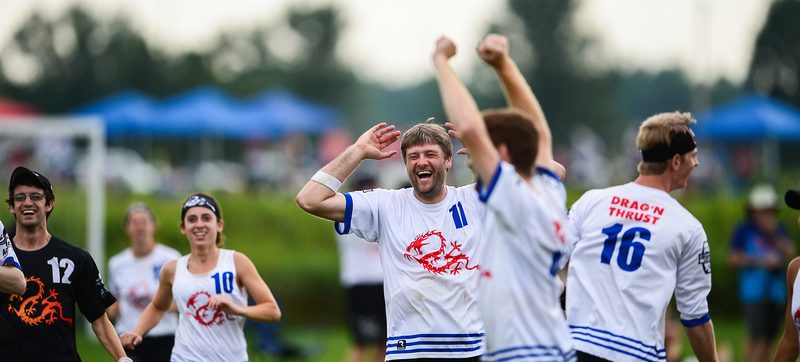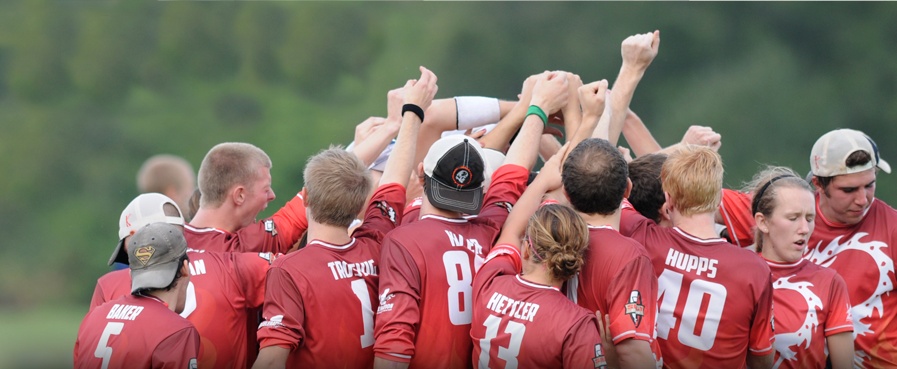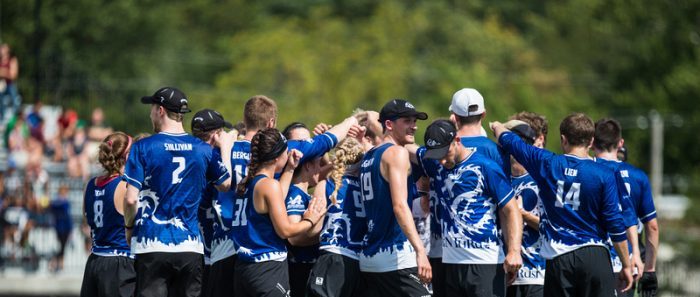By Eric Olson
Like pretty much any activity ever, improving at ultimate requires learning. There are many ways to go about learning in ultimate, but the more efficient varieties involve learning from others. Over the past five years I’ve played for at least seven distinct college/club/pro teams, coached middle school and high school kids, and played in various leagues and one-off tournaments. During this time I’ve realized the importance other players take in the process of personal development. Obviously the best players have wisdom to impart and skills to emulate, but something can be learned from all players young and old, new and experienced. For this reason I believe it is important to play and be around ultimate as much as possible.
Note that there are a lot of other parts of learning, like practicing, that are critical and not focused on in this post. Some of these have been already discussed or may be written about in future posts… only time will tell.
Why is it important to learn from others?
It has taken many years for the concepts and skills in ultimate to take the form they have today. Looking back at highlights from the days of NYNY it is obvious there were some talented players, but it is also apparent that the game has evolved substantially at all levels since. There is no need to constantly reinvent the wheel (disc) that may have taken years for someone or group of someones to figure out.
A lot of important ultimate concepts and skills have been practiced for much longer in other sports and brought in by multi-sport players. Body positioning? Basketball players are highly skilled at this. Throwing? Pitchers spend serious time focusing entirely on the mechanics of throwing. Field awareness? Most team sports require it. Most current ultimate players did not grow up starting with ultimate. Look across any current top ultimate team and you will see players who spent significant time playing soccer, basketball, hockey, running, etc.
All of this experience and wisdom grown over the years in ultimate and other sports is much easier to learn from others than discover on your own. Is there a part of your game you feel is lacking? Odds are high that someone you know or in your area has spent considerable time towards mastering that skill. Being able to leverage that knowledge is extremely helpful.
What can I learn from others?
Specific skills. Most ultimate players have difficult backgrounds and have honed different skills. How does Jeff Trosvig throw that flick? How does Austin Lien make his marker look silly? How does Sarah Meckstroth position herself to come down with the disc time and time again? They were not born with these skills – at least I don’t think they were – but spent years developing. Often players are more than happy to give advice on how they do what they do well and how they got to where they are today.
Strategy. Everyone and every team has their own way of looking at the game. Maybe it’s a different stack, or maybe even just a slight tweak of a stack. Learning these different strategic versions helps develop a critical thought process around why offensive and defensive strategy is set up the way it is. Ultimate cannot thrive solely on set plays, but instead needs creativity and flow out of a structure. Learning the merits of other schemes can lend to specific situations on the field.
Playing with newer players. What’s often overlooked is what can be learned by playing with newer players. All of a sudden, you may need to concentrate on throws being more accurate and cuts more open. Maybe you no longer have your favorite target to throw to (or cut for) anymore.
Coaching. There are a lot of great reasons to coach – like those outlined by Sarah Meckstroth last week – but there is also benefit to your own personal development. Those of you who coach or have coached are probably nodding along in agreement. Taking the time to break down the game to the most important fundamentals and teaching those in different ways really helps reinforce the fundamentals in your own game. Numerous studies have shown that one of the most effective ways to learn and internalize is to teach that same skill or concept. I love the time I’ve been able to spend helping coach middle school and high school kids and feel strongly that I’ve become a better player because of it.
How can playing often and with many different people help?
Strategy. This was mentioned in the last section, but there’s more! Playing with different teams means playing with different personnel. Different players means certain strategies may be more or less optimal. It is helpful to learn how to play in all sorts of systems in the chance that certain key roles are harder to fill – due to injuries, roster turnover, etc.
Rolodex. Lou Burruss wrote a great piece about building a rolodex of defensive match-ups. I think this concept can easily be expanded to the offensive side of the disc. The more players you play with, the easier it will be to exploit the strengths of your teammates – or weaknesses of your opponents.
Levels of play. Learning skills in ultimate is not a binary event. The process takes time and the skills improve more or less gradually. To bring a specific aspect of your game, let’s assume it is a specific break throw for simplicity sake, to your most competitive level, you have to practice. Obviously, you don’t want to immediately insert a raw skill into situations where the stakes are high and errors are costly. How can it be worked in? Most often it follows a progression: practice visualizing the break while throwing on your own or with a partner; try it out in specific breaking drills, use it in pick-up games, league games, and up the ladder until it has become part of the repertoire. By participating in all these different competitive levels of play, you can feel confident when the game is on line.
Leadership. Different team leadership – be it captains or coaches – will have different opinions and visions on how you can improve as a player and how your skills fit within the team. Playing for and developing from multiple helps provide more skills and more learning opportunities. Everyone learns differently and finding the best way for you to learn is helpful.
Your teammates. While most players would be more than happy to share wisdom and experience if asked, it is easier to learn the skills you want from someone you play with. Teammates obviously spend more time together and have a higher incentive to help you improve.
Your role. Frequently, new players are put in a very specific role for the team. There are a lot of good reasons to do this, but it helps experience the game from many faces. Maybe on your college team you are a tertiary cutter who rarely touches the disc. Playing in a hat tournament or on a league team and being thrust into a central role with many touches accelerates the learning process. A lot of players are thrust into roles (cutters or handlers) and infrequently play the other way. Being able to play in all roles not only lends a greater understanding for what your offensive counterpart wants, but also makes you a harder defensive matchup (or vice versa).
Recommendations for playing as much as possible
I remember a blog post Brandon “Muffin” Malecek wrote a few years ago about why he tried to play in as many tournaments a year as possible (I can’t actually find the post, so if you can, let me know and I’ll link it). While playing in 30+ tournaments is infeasible for most people, there are plenty of ways to play often, weather permitting. Join local leagues. Sign up for hat tournaments – Drag’n Just happens to be hosting one coming up soon as a fundraiser for worlds: https://www.facebook.com/events/1427796300812457/ (so come on out!). Find (or make) teams to play with at other one-off tournaments like Lei-Out, Sand Blast, Potlach, or other fun local out-of-season tournaments. Try out for the best teams around. This is a biggie. I cannot emphasize enough how much can be learned even in a few short tryouts. I remember my freshman year of college when, as a brand new player who could barely throw a flick, our coach encouraged us to tryout for Sub Zero. There was no chance of me actually making the team, but that experience was invaluable. Tryout for many teams. Coach. Organize pickup games. All of these are great ways to find varying places to play.
Like everything else, ultimate requires learning to improve. There are many ways to learn, but it is hard to get better without the knowledge and wisdom of others who have already gone through – and are still going through – the same process. Be it picking up someones else’s skill, building chemistry with different types of players, or developing your own skill, playing as much as possible only helps. Happy playing. Happy learning.




